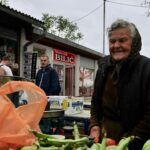Many people are already familiar with the popular breed of dogs known as Dalmatians, but did you know where they
originate from? One young American business author went on a journey to discover the land of the Dalmatians, and
at the same time discover his own distant family lineage.
The business author, who writes on Amazon under pen name Albert Anthony, traces his ancestral roots to this region, and recently went on a journey to learn more about the area, using newly digitized birth & death records to trace his lineage as far back as the early 19th century.
An Ancient Land of Mountains & Sea.
The Dalmatia region, today in the southern coastal part of the Republic of Croatia stretching along the Adriatic Sea, was in ancient times part of the Roman Empire, and much later part of the Venetian Republic. After the fall of the Venetian state, in the 19th century a Kingdom of Dalmatia was formed and became a province of the larger Austrian Empire during the Habsburg Dynasty. After WWI, parts of Dalmatia went either to the newly formed Kingdom of Yugoslavia or the Kingdom of Italy, and after WWII it was part of Yugoslavia until the breakup of that state in 1991.
“This land and its people are used to adapting to change over the centuries, but one constant remains and that is the picturesque landscape of mountains touching the sea, the ancient cities, and archipelago of islands of this region that have now been attracting the camera lens of travelers for decades,” Albert Anthony says. “Besides being the origin of the Dalmatian breed of dogs, it is also a land of diverse people. I see that every day in the food, music, traditions & architecture.”
photo source: author collection
A Long History of Trade & Commerce.
Due to its strategic position on the Adriatic Sea, the region has long been strategic in terms of trade & commerce. Its major cities such as Zadar, Split, Sibenik, for example, are also significant ports & harbors, while in more recent years have experienced growth in air travel as well as modernized highways linking the region to the interior.
“Trading is already in the blood of many Dalmatians, so it was only natural that I saw myself as a business writer who often writes about building a culture of ownership & investing,” the author remarks. “Thanks to hi-speed wifi available today in most parts of this region, even on many islands, one eCommerce project I am able to manage is an eLearning course I teach on the global elearning platform Udemy. You can be sitting in a Dalmatian coastal cafe and have students from the other side of the planet!”
The Emergence of Rural Tourism.
For many global travelers, the Dalmatia region is already known for its beaches and ancient cities to explore, but more recently a trend towards rural tourism is emerging, which is centered around attractions like rural lifestyles, olive oil, wine, & healthy living.
“Those of us who have worked in the IT sector know the importance of stepping away from the technology and getting out into the fresh air when possible, so I am seeing many more people lately experience the Dalmatia region beyond just the beaches and old towns, but experiencing the rural lifestyle as well,” Albert Anthony reiterates. “This is also leading to the growth of agrotourism as a subset of the tourism industry. For example, travelers looking to experience authentic local olive oil at a centuries-old family farm with the Velebit Mountains in the background. It is more than just a photo opportunity, it is about the holistic experience. I predict this will help make Dalmatia a regional leader in this space, both economically & culturally. After all, it did have its own kingdom once!”
Author Info & Links:
The author was born Albert Anthony Bozulic in the New York City area, and writes under pen name Albert Anthony. You can reach the author via email at albertanthony.co@gmail.com, or via Whatsapp at +385 (91) 7517997.











